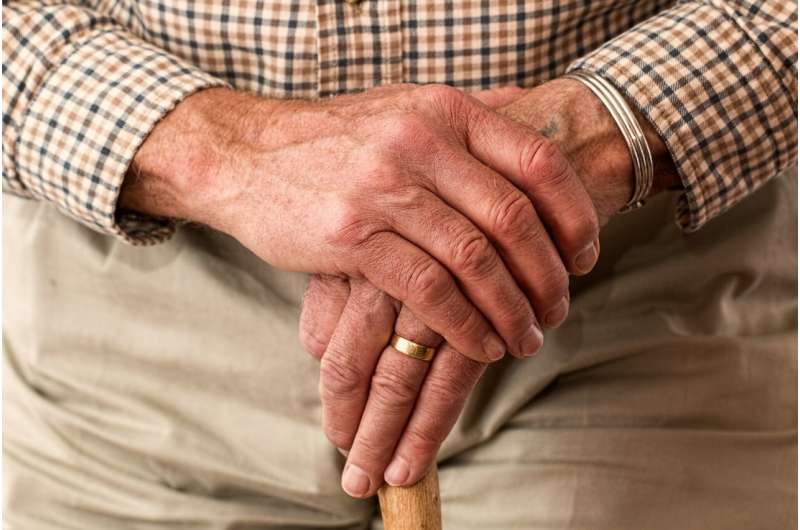This article has been reviewed according to Science X's editorial process and policies. Editors have highlighted the following attributes while ensuring the content's credibility:
fact-checked
trusted source
proofread
Supporting older adults displaced by wildfires

As health care teams worked tirelessly to evacuate long-term care residents from wildfire-ravaged regions of B.C. and the Northwest Territories, many older adults have been relocated far from home.
The harrowing feat removed hundreds of vulnerable seniors from harm's way, but it's left many family members, friends and care providers wondering how they can best support older adults through the sudden and disruptive change.
We spoke with Dr. Roger Wong, clinical professor of geriatric medicine at UBC, about the impact this is having on seniors and the steps people can take to support their loved ones.
What impact do evacuations have on older adults in long-term care, especially those living with dementia or Alzheimer's?
For many older adults in long-term care, this sudden change represents a profound loss. Long-term care is not just a location, it is their home. It's their community and social support system. Having to leave that all behind on a moment's notice is a tragic loss that has impacts mentally, emotionally and physically.
Older adults can be particularly vulnerable to abrupt disruptions in their environment and routine. This is especially true for people living with dementia or Alzheimer's who may have difficulty understanding the full scope of the situation. This can manifest itself in many ways, including feelings of confusion, low mood, anxiety and depression, or it can cause people to exhibit unexpected reactive behaviors, such as anger or frustration. Moving to a new environment can also aggravate pre-existing health conditions and exacerbate impairments in vision, hearing and mobility that many seniors experience.
Every individual's experience is unique, so it's important that we support seniors in long-term care and offer them patience, understanding and compassion. I also want to recognize the incredible teams of care providers—doctors, nurses, personal support workers, care aides and many others—who have been working tirelessly to keep long-term care residents safe from wildfires and to make these transitions as smooth as possible.
What practical steps can people take to support older adults who have been relocated?
One of the most crucial steps is to re-establish a stable routine for each person as quickly as possible. Getting back to a routine—in terms of meals, sleep schedule, hygiene, activities, medical care and consistent staffing whenever feasible—can provide a sense of safety and comfort. Sticking with that routine is important too. We want to minimize the number of room-moves and disruptions people experience as much as possible.
To prevent, or at least reduce the likelihood of, confusion that may be associated with relocation, it is important to use glasses to maintain adequate vision and hearing aids to maintain adequate hearing.
Building a sense of familiarity is also key. Incorporating personal items, such as family photos or familiar music, back into a person's life can ease transitions. A concept called "constant reorientation" can be helpful for older adults, which involves keeping items like a clock, calendar or newspaper nearby to help them continuously orient themselves in a new setting.
Resuming physical activity early on and soon after relocation will also bring multiple benefits, from maintaining physical health to alleviating stress. While it's beneficial to organize group activities that encourage socialization and new friendships, that can be difficult in an emergency situation when resources are stretched thin. Technology and video-conferencing tools can help fill the gap by keeping seniors engaged in group activities remotely.
Lastly, preserving social connection is critical. We saw during the pandemic just how challenging social isolation can be for many seniors. While it may not always be possible for family and friends to visit long-term care residents who have been relocated, phone and video calls can help maintain social connections over long distances. The aim is to maintain a sense of community and connection among seniors as much as possible.
What advice do you have for the family and friends of long-term care residents?
Connect with your older loved ones in the way that works best for your situation. For older adults living with dementia, it can be helpful to keep the same consistent message in a simple manner. Reassure them that they are safe, that they are not being abandoned and that they are loved.
This is a challenging time for everyone, including for the loved ones of long-term care residents, many of whom have been displaced themselves as a result of the evacuation. This is a moment when a lot of people are feeling helpless, but it's important to be kind to yourself and to take care of your own emotional and physical well-being so that you can be effective in providing support to others.





















